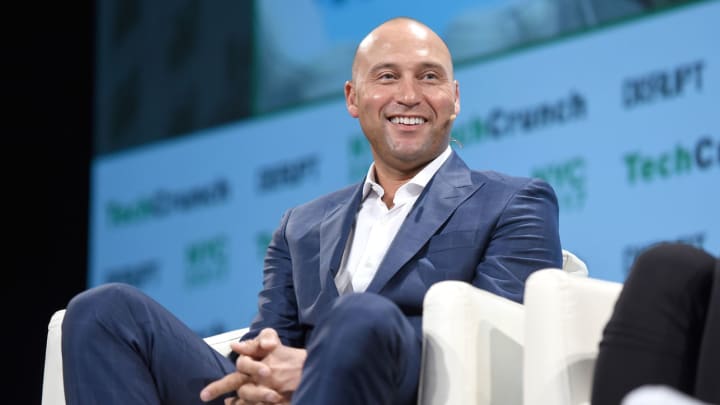Derek Jeter's Reported Plan to Slash Payroll Is a Cruel Twist to Suffering Marlins Fans

Meet the new boss, same as the old boss? That might be the case for Marlins fans, who will soon be free of Jeffrey Loria and his perpetual fire sales, but may find the team’s new owner all too eager to continue that process. On Sunday, the Miami Herald’s Barry Jackson reported that Derek Jeter, who agreed to purchase the team from Loria last month, wants to cut Miami’s payroll drastically—potentially by as much as $60 million—once he takes over, consigning the Marlins yet again to irrelevance just as they seemed to be climbing into a better place.
According to Jackson, Jeter—who bought the team for $1.2 billion alongside businessman Bruce Sherman—told a potential investor earlier this summer that his first order of business at Marlins Park would be to shrink the payroll. Miami is currently sitting at $115 million in salary commitments, but Jeter wants that number to drop to as low as $55 million in 2018, depending on whether or not the front office is able to trade superstar slugger Giancarlo Stanton, who is owed $25 million next year. Should Stanton remain a Marlin, Jeter reportedly wants the team to come closer to $80–85 million for next season.
Even that latter figure would be a steep drop for the Marlins. Excluding Stanton, they don’t have much in the way of big contracts to offload this winter. Dee Gordon, Martin Prado and Edinson Volquez are the only other players on the roster set to make more than $10 million next season, with Wei-Yin Chen joining them once he exercises his $10 million player option. But Prado, Volquez and Chen are all injured and performed poorly when healthy, making it unlikely that the Marlins will be able to dump them without having to eat salary in exchange—or gain nothing in the way of a return if they don’t.
Adrian Beltre's Antics, Giancarlo Stanton's Power Anchored a Very Fun August
What is more likely is that Jeter and company will try to move Stanton, Christian Yelich (who’s owed $7 million next year and is under contract for another $36.25 million through 2021) and anyone else currently above the $1 million mark, then try to rebuild on the cheap. But those players are the core of the team, and while they’ll bring back a better return than the busted likes of Prado or Volquez, selling them off to save money will doom the Marlins to a dismal 2018 season—and likely far longer than that.
Jeter, then, is following the blueprint laid out by Loria, who has twice dismantled his team in an effort to save money. The last time he did so was midway through the 2012 season, when the winter spending spree that brought Jose Reyes, Mark Buehrle and Heath Bell to Miami blew up in his face. It took the Marlins four seasons to return to any semblance of competitiveness after that, and despite the death of Jose Fernandez last September and a brutally slow start to the season, this year’s team is amid a second-half surge that has taken it to the cusp of wild-card contention. The driving force has been Stanton, who has erupted for 26 home runs in just 48 games since the All-Star break and leads the majors in round-trippers with 52.
What’s unclear is whether or not this late run will be enough to stay Jeter’s hand. Jackson notes that the potential investor was told about the payroll plans before the Marlins jumped into the playoff race, and that the presence of an actual contending team in Miami—one fronted by an MVP candidate in Stanton—could complicate the situation. Selling off the parts on a bad team is far easier to explain to fans than getting rid of the productive and popular parts of a good team, and it would be a disastrous first step for Jeter to walk down the same path that Loria spent years paving.

It would also be a terrible look for Major League Baseball and Commissioner Rob Manfred if a new ownership group were to come in and try to run things on the cheap. There’s no question that the Marlins, as a franchise, have some serious issues. The roster lacks depth, and the farm system has been weakened by years of neglect. Empty seats frequently outnumber paid customers at Marlins Park: The team is 27th in baseball in total attendance this season and hasn’t been out of the bottom five in five years. The Marlins also missed out badly on the regional sports network gold rush. The team’s broadcast deal with Fox Sports Florida pays out only $16–18 million a year—compare that to the Dodgers’ deal with Time Warner that pays them as much as $280 million every season—and can’t be renegotiated until after the 2020 season, by which point the RSN bubble may well have burst.
But for as bad as the Marlins have it, MLB can’t be happy with the idea that Jeter doesn’t seem to have any desire to put money into the franchise. According to Jackson, the Sherman/Jeter group has said that it has little liquid capital to afford adding to payroll. Even worse is that Jeter reportedly wants to pay himself $5 million a year to own the team so as to recoup the $25 million he put into the winning bid. MLB team owners are a rapacious group by and large, but the thought of new tenants dropping a billion dollars on a franchise and immediately shipping all the high-priced talent out of town while pocketing payroll for themselves may be too much even for them.
The Mets Will Start Matt Harvey on Short Rest Because They've Gone Insane
Miami is as messed-up a situation as exists in baseball, but the city isn’t some tiny backwater with no fans, no stadium and no hope. With energy, patience and wise investments, there are plenty of ways to make the Marlins good. They already have an enormous leg up on the competition thanks to Stanton, and even with his contract taking up a fifth of the payroll by itself, there’s no reason an ownership group with deep pockets can’t invest more into the team. And whatever gets spent on the team will almost certainly be repaid by a fan base eager to care after years of watching Loria pinch pennies and bilk the city.
It would be a colossal mistake and deeply wrong on the part of Jeter and Sherman to come to Miami and immediately tear things down. To give up right from the get go would be to admit openly that professional baseball isn’t worth the effort in Miami, and if the new ownership group can’t commit to doing what’s right for the franchise and its fans, then they shouldn’t be allowed to purchase the team. Manfred and MLB may desperately want Jeter back in the fold, and they likely want to sell fans on the idea of a new day coming in Miami. But should Jeter buy the team, it looks like it’ll be the same old story for both players and fans.
